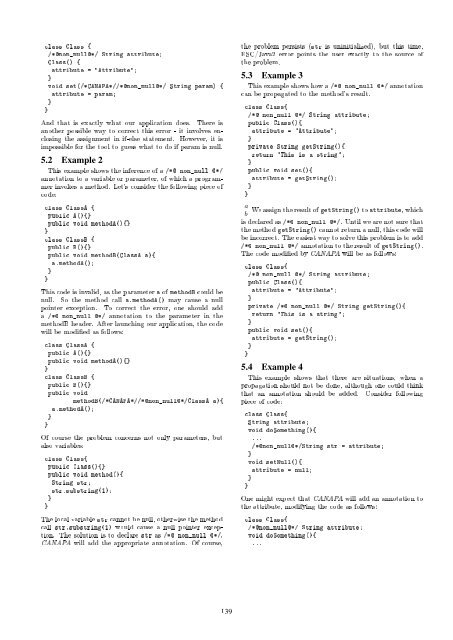4th International Conference on Principles and Practices ... - MADOC
4th International Conference on Principles and Practices ... - MADOC
4th International Conference on Principles and Practices ... - MADOC
You also want an ePaper? Increase the reach of your titles
YUMPU automatically turns print PDFs into web optimized ePapers that Google loves.
class Class {<br />
/*@n<strong>on</strong>_null@*/ String attribute;<br />
Class() {<br />
attribute = "Attribute";<br />
}<br />
void set(/*CANAPA*//*@n<strong>on</strong>_null@*/ String param) {<br />
attribute = param;<br />
}<br />
}<br />
And that is exactly what our applicati<strong>on</strong> does. There is<br />
another possible way to correct this error - it involves enclosing<br />
the assignment in if-else statement. However, it is<br />
impossible for the tool to guess what to do if param is null.<br />
5.2 Example 2<br />
This example shows the inference of a /*@ n<strong>on</strong>_null @*/<br />
annotati<strong>on</strong> to a variable or parameter, of which a programmer<br />
invokes a method. Let's c<strong>on</strong>sider the following piece of<br />
code:<br />
class ClassA {<br />
public A(){}<br />
public void methodA(){}<br />
}<br />
class ClassB {<br />
public B(){}<br />
public void methodB(ClassA a){<br />
a.methodA();<br />
}<br />
}<br />
This code is invalid, as the parameter a of methodB could be<br />
null. So the method call a.methodA() may cause a null<br />
pointer excepti<strong>on</strong>. To correct the error, <strong>on</strong>e should add<br />
a /*@ n<strong>on</strong>_null @*/ annotati<strong>on</strong> to the parameter in the<br />
methodB header. After launching our applicati<strong>on</strong>, the code<br />
will be modied as follows:<br />
class ClassA {<br />
public A(){}<br />
public void methodA(){}<br />
}<br />
class ClassB {<br />
public B(){}<br />
public void<br />
methodB(/*CANAPA*//*@n<strong>on</strong>_null@*/ClassA a){<br />
a.methodA();<br />
}<br />
}<br />
Of course the problem c<strong>on</strong>cerns not <strong>on</strong>ly parameters, but<br />
also variables:<br />
class Class{<br />
public Class(){}<br />
public void method(){<br />
String str;<br />
str.substring(1);<br />
}<br />
}<br />
The local variable str cannot be null, otherwise the method<br />
call str.substring(1) would cause a null pointer excepti<strong>on</strong>.<br />
The soluti<strong>on</strong> is to declare str as /*@ n<strong>on</strong>_null @*/.<br />
CANAPA will add the appropriate annotati<strong>on</strong>. Of course,<br />
the problem persists (str is uninitialized), but this time,<br />
ESC/Java2 error points the user exactly to the source of<br />
the problem.<br />
5.3 Example 3<br />
This example shows how a /*@ n<strong>on</strong>_null @*/ annotati<strong>on</strong><br />
can be propagated to the method's result.<br />
class Class{<br />
/*@ n<strong>on</strong>_null @*/ String attribute;<br />
public Class(){<br />
attribute = "Attribute";<br />
}<br />
private String getString(){<br />
return "This is a string";<br />
}<br />
public void set(){<br />
attribute = getString();<br />
}<br />
}<br />
a<br />
We assign the result of getString() to attribute, which<br />
b<br />
is declared as /*@ n<strong>on</strong>_null @*/. Until we are not sure that<br />
the method getString() cannot return a null, this code will<br />
be incorrect. The easiest way to solve this problem is to add<br />
/*@ n<strong>on</strong>_null @*/ annotati<strong>on</strong> to the result of getString().<br />
The code modied by CANAPA will be as follows:<br />
class Class{<br />
/*@ n<strong>on</strong>_null @*/ String attribute;<br />
public Class(){<br />
attribute = "Attribute";<br />
}<br />
private /*@ n<strong>on</strong>_null @*/ String getString(){<br />
return "This is a string";<br />
}<br />
public void set(){<br />
attribute = getString();<br />
}<br />
}<br />
5.4 Example 4<br />
This example shows that there are situati<strong>on</strong>s, when a<br />
propagati<strong>on</strong> should not be d<strong>on</strong>e, although <strong>on</strong>e could think<br />
that an annotati<strong>on</strong> should be added. C<strong>on</strong>sider following<br />
piece of code:<br />
class Class{<br />
String attribute;<br />
void doSomething(){<br />
...<br />
/*@n<strong>on</strong>_null@*/String str = attribute;<br />
}<br />
void setNull(){<br />
attribute = null;<br />
}<br />
}<br />
One might expect that CANAPA will add an annotati<strong>on</strong> to<br />
the attribute, modifying the code as follows:<br />
class Class{<br />
/*@n<strong>on</strong>_null@*/ String attribute;<br />
void doSomething(){<br />
...<br />
139





